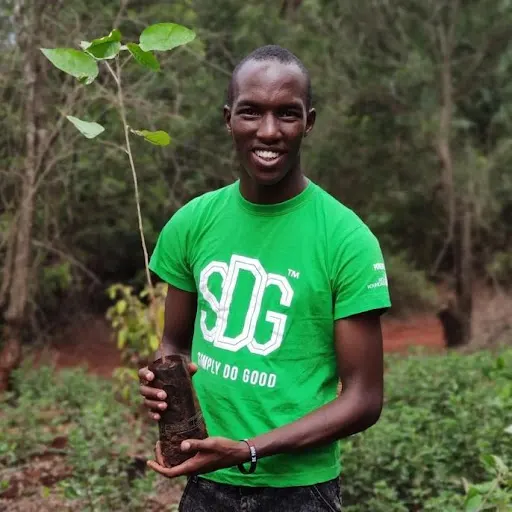Meet the Obama leader in Africa turning invasive plants into a plastic alternative
Joseph Nguthiru, a 2023 Obama Foundation Africa Leader, and his classmates spent five hours trapped in Kenya’s Lake Naivasha in 2021 because their boat was hemmed in by a dense mat of an aquatic weed.
“While that sounds like fantasy, that was where our journey began,” he reflected with a smile.
Nguthiru and his colleagues were stuck in water hyacinth, the world’s most problematic aquatic weed, which affects more than 70 countries globally. The weed causes problems in fishing, navigation, irrigation, and water treatment, among other issues, creating economic struggle. The experience Joseph had in his boat put things in perspective and galvanized him to create a solution to the nagging problem.
“We decided to take this up as our final-year engineering project. However, Egerton University, like other public Kenyan universities, was cash-strapped, so it was suggested that we could alternatively research using other aquatic weeds from the school’s botanical garden to save on costs,” he shared. “Unfortunately, the swamp was drying up due to climate change, so we organized a massive tree planting event and partnered with neighboring communities to plant close to 4,000 seedlings. At the end, that meant that we had nearly that many plastic bag seedling wrappers to discard. That was our eureka moment. We decided to use one problem to solve the other.”
Today, Joseph is the founder of HyaPak Ecotech Limited (HyaPak), a Kenyan-based start-up that is transforming the water hyacinth plant into biodegradable alternatives for single-use plastic products.
“We started with single-use plastic products like straws, tumblers, and plastic plates, but the molds for mass-producing these are a bit capital-intensive so we pivoted to biodegradable packaging bags and seedling wrappers to replace single-use plastic bags. Single-use plastic bags have been banned in Kenya, and our solution brings a much-needed alternative to the country,” Nguthiru said.
As a product of the water-stricken community of Eastlands Nairobi, Nguthiru says improving the environment was his responsibility.
“A strong sense of duty led to a culture of problem-solving,” he reflected. “Problem solving happens through innovation. Studying water and environmental engineering nurtured this innovation culture into sustainability and climate action.”
HyaPak has won several awards for its innovation that have enabled it to do ground-breaking research and product development. To date, HyaPak has eliminated over 700 kg of water hyacinth from Lake Naivasha in Kenya.
Recently, HyaPak partnered with the Government of Kenya to create a framework for its innovation to be adopted and implemented through the country’s Forestry and Land Restoration Acceleration program, Jaza Miti, which commits to planting 15 billion trees over the next 10 years.
In addition to his efforts at HyaPak, Nguthiru is the inventor of a solar dryer that is now being used to revive pyrethrum plant farming in Kenya.
“I designed the solar dryer to help farmers dry the flowers to the right conditions, and this is now being used throughout the country to revive the crop,” he said.
Nguthiru also runs social-environmental projects under the Adopt a River initiative, which has eliminated over three tons of waste from polluted rivers across Kenya through involving communities in environmental education, river cleanups, and restorations.
“My biggest realization has been that innovations alone would not stop the climate crisis. It is paramount to have communities at grassroots levels to help realize the need for climate action and environmental conservation,” he shared.
Nguthiru says being a part of the Obama Foundation Leaders program has been instrumental in his personal and professional leadership journey.
“The facilitators and my coach Nicholas Wambug are amazing. He and I connected on so many levels. I’ve been able to learn from like-minded mentors and leaders who have aided all areas of my development,” he said.
He has won many accolades for his innovation, including Meta’s Top 25 Under 25 Young Climate Prize, but he says he is most proud of the impact his work has had on his community and country.
“The key to sustainability is to make sure we understand how systems work and make sure we improve on them so that we can be prepared for tomorrow without compromising human welfare,” Nguthiru said. “There’s still more to do. At the end of the day, it is the impact that we create that lives on.”


